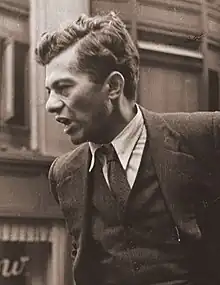
Jews Without Money is a 1930 semi-autobiographical novel by American critic Mike Gold.
Description
Published by Horace Liveright shortly after the onset of the Great Depression,[1] the novel is a fictionalized autobiography about growing up in the impoverished world of the Lower East Side, beginning in the 1890s.[2] Jews without Money was an immediate success and was reprinted 25 times by 1950. It was translated into 16 languages.[3] It became a prototype for the American proletarian novel.[4]
Jews without Money is set in a slum populated mainly by Jewish immigrants from Eastern Europe. The father of the hero is a Romanian-born painter who suffers from lead poisoning. When he falls from a scaffold, he is disabled and can no longer work. His business fails and the family is pushed into poverty. The mother has to seek work in a restaurant. Although he is a bright boy, young Michael decides he must leave school. On the final page of the book, the poor Jewish boy prays for the arrival of a Marxist worker's revolution that will emancipate the working class.
The novel depicts a Zionist entrepreneur's fatal extortion of a poor Jew, which has been read as a proletarian critique of both American capitalism and of Zionism as a "bourgeois" movement that does not serve the interests of working-class American Jews.[lower-alpha 1][5]
In his authorial note to the novel, Gold wrote, "I have told in my book a tale of Jewish poverty in one ghetto, that of New York. The same story can be of a hundred other ghettoes scattered over all the world. For centuries the Jew has lived in this universal ghetto."
See also
References
- ↑ Jews without Money, New York: Horace Liveright, 1930. Reprinted by Carol & Graf, 2004.
- ↑ Barry Gross, "Michael Gold (1893–1967)", The Heath Anthology of American Literature, ed. Paul Lauter, 5th edition. http://college.cengage.com/english/lauter/heath/4e/students/author_pages/modern/gold_mi.html
- ↑ Taylor Dorrell (October 16, 2022). "Mike Gold Was a Working-Class Hero". Jacobin.
- ↑ Tuerk, Richard. “‘Jews Without Money’ as a Work of Art.” Studies in American Jewish Literature (1981-), vol. 7, no. 1, 1988, pp. 67–79. JSTOR, http://www.jstor.org/stable/41205675. (subscription required) Accessed 27 Jan. 2023.
- ↑ "Mike Gold, the Writer Who Believed Workers Could Speak for Themselves". Jacobin. Retrieved 2023-05-06.
Sources
- Balthaser, Benjamin (June 2020). "When Anti-Zionism Was Jewish: Jewish: Racial Subjectivity and the Anti-Imperialist Literary Left from the Great Depression to the Cold War". American Quarterly. 72 (2): 449–470. doi:10.1353/aq.2020.0019. S2CID 226699923.
Notes
- ↑ Jews without Money deals with the travails of a Rumanian Jewish painter who seeks to rise out of his difficulties by cultivating the company of a wealthy Brooklyn Zionist leader Baruch Goldfarb, depicted as a bourgeois fraudster who prays on gullible working-class Jews. Goldfarb offers him glowing prospects, a house in "God's country", a Jewish enclave in the suburbs, away from the multiethnic milieu he lives in and who gets him to join his gaudy, politicized lodge where vote-rigging and spying on labour unions is organized. Goldfarb eventually wheedles him out of his money (Balthaser 2020, pp. 449–450).